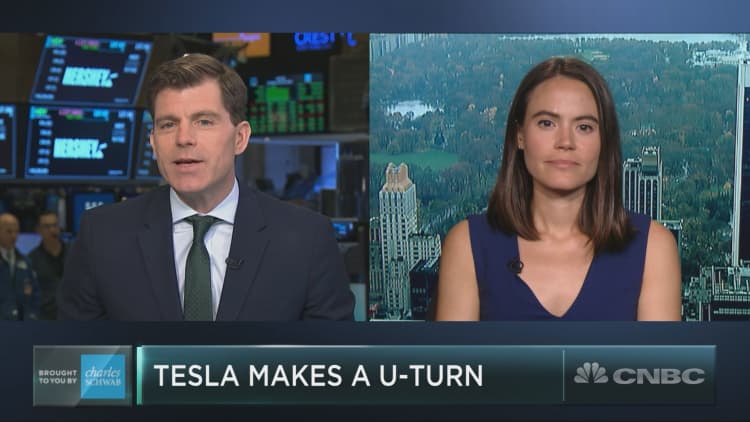
Tesla could take the lead in autonomous driving in the coming years, according to one analyst.
The beleaguered electric automaker has seen its shares decline 32% this year amid concerns around its pace of production and demand for its vehicles. The stock is up 22% this month as investors regain faith in the company after CEO Elon Musk's deal with the Securities and Exchange Commission to stop tweeting about Tesla's performance.
But Tesla has a massive opportunity in self-driving vehicles that most of Wall Street seems to be discounting, said Tasha Keeney, an analyst at Ark Invest covering industrial innovation.
"We think the autonomous driving market is going to be a huge opportunity. We think this should be valued at $2 trillion today in the equity markets, and it's virtually unaccounted for," Keeney said Tuesday on CNBC's "Trading Nation." "We think Tesla has a great lead there, and that's because of the data advantage that they have."
Unlike Alphabet's Waymo or General Motors' Cruise Automation, two self-driving projects that have garnered buzz on Wall Street, Tesla has the added advantage of actually selling a product through which it can gather consumer data, Keeney said.
"They're the only automaker collecting data from customer cars. They use that to train their machine learning algorithms, and we think that's what's really going to pay off," she said.
That's evidenced by a rule Tesla enforces among lessees of its standard Model 3 cars, Keeney said. Those who lease a Model 3 aren't allowed to keep it after the lease expires, she said, adding that her team's theory is that Tesla wants to use those cars to "seed their autonomous vehicle market" with the driver data it gathers.
"They've been talking about launching the Tesla network for some time — their version of Uber — and we might even see them launch ride-hailing just to sort of test out the kinks in the system before they reach full autonomy," Keeney said. "That could even happen in the next, say, year or so, if they want to do that ahead of time. And we think that's what they should do."
That could put Tesla at a slight advantage to Waymo and Cruise, which are still in a position to be front-runners in autonomous driving when commercialization begins, Keeney said.
"We think that most of the economics will go to the platform provider," she said. "These are really the companies that own the full technology stack, the companies that are actually making the car autonomous, that have that software advantage and will get those nice software-like margins. So, Tesla sits nicely in that place."
And when it comes to ride-hailing giants Uber and Lyft, which went public earlier this year to a great deal of fanfare, they will likely need the support of other companies to make a serious impact on the self-driving space, Keeney said.
"Uber and Lyft could potentially have a role ... but, again, it would have to be through partnership with a technology company that could actually provide that autonomy, because it doesn't seem like Uber and Lyft right now have credible autonomous driving programs in house today," Keeney said.
And, with Ark predicting that 26 million electric vehicles will be sold in the U.S. by 2023 — a forecast that hinges on the firm's expectation that battery costs will decline dramatically over the next several years — Tesla maintains its market advantage even in Keeney's worst-case scenario.
"Our bear case has them losing two-thirds of their market share today [in EVs], and our bull case has them losing one-third. So, they'd be, say, in the teens or at 11% of the market in both of those scenarios," she said, adding that the bear case also assumes that Tesla doesn't reach full autonomy.
Even so, Ark — which is known for its $4,000-per-share price target on Tesla — sees the stock rising to $500 or $600 a share in the bear-case scenario, which also predicts that the company will need to raise capital in the next few years.
"We really think they're years ahead of the competition today on battery production alone, so we just want them to get as much market share as possible, get as many cars on the road as possible," Keeney said. "So, we actually are assuming that they lose share, but, again, it's because the EV market is going to be much larger than we think most people will expect."
Tesla gained less than 1% in afternoon trading Wednesday. The shares are down about 36% for the last 12 months, with the majority of the losses occurring in early 2019.






